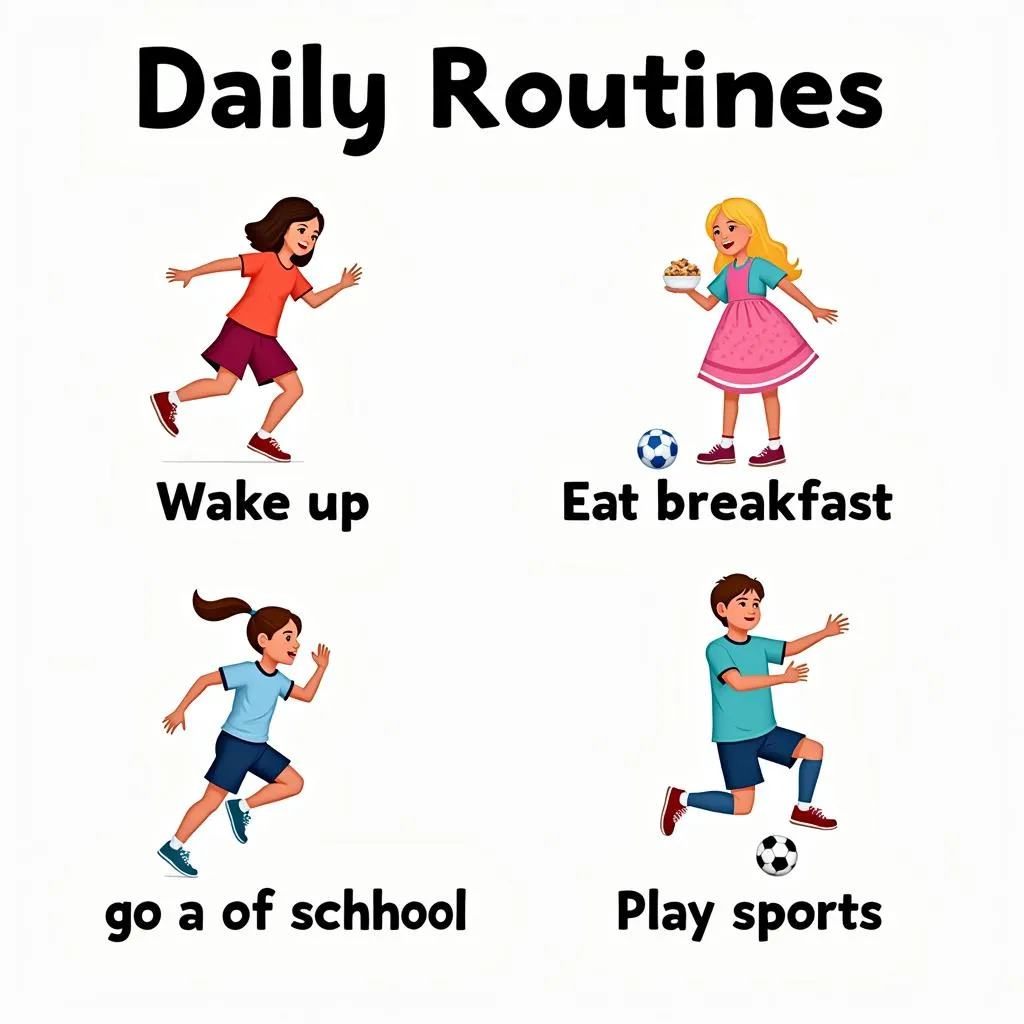Learning English can be an exciting adventure, especially for Grade 7 students who are starting to explore the world around them. Unit 2 of your English textbook is a great stepping stone in this journey, introducing you to new vocabulary, grammar, and communication skills. In this comprehensive guide, we’ll delve into the key concepts of Unit 2, “Getting Started,” and equip you with the tools and knowledge to confidently navigate this learning stage.
Understanding the Unit’s Theme: “Getting Started”
The title “Getting Started” hints at the unit’s focus on introducing foundational English skills. It’s like stepping into a new game, where you’re learning the basics to play effectively. We’ll explore how this theme unfolds across different topics, from vocabulary about daily routines to grammar rules for simple sentences.
Key Vocabulary: Mastering Everyday Words
Building a strong vocabulary is like building a strong foundation for your English skills. This unit introduces words related to daily routines, hobbies, and personal information. Let’s dive into some key vocabulary terms:
Daily Routines: Words That Shape Our Day
- Wake up: The start of your day.
- Go to bed: Ending your day with rest.
- Have breakfast/lunch/dinner: Eating meals throughout the day.
- Get dressed: Putting on your clothes.
- Take a shower/bath: Keeping clean.
- Go to school/work: Your daily activities.
Hobbies and Interests: Exploring What We Love
- Play sports: Engaging in physical activities.
- Read books: Immersing yourself in stories.
- Listen to music: Enjoying melodies and rhythms.
- Watch movies: Experiencing entertainment on screen.
- Travel: Discovering new places.
Personal Information: Sharing Who We Are
- Name: Your personal identifier.
- Age: How old you are.
- Address: Where you live.
- Phone number: How to contact you.
- Email address: Your online communication channel.
Expert Tip:
“Remember, vocabulary is like a toolbox. The more words you have, the more effectively you can express yourself,” advises Dr. Sarah Thompson, a renowned language educator.
Grammar Foundations: Building Sentences with Confidence
Learning grammar is like learning the rules of the English language. It helps you construct clear and meaningful sentences. Here are some fundamental grammar points covered in Unit 2:
Simple Present Tense: Describing Routine Actions
The simple present tense is used to describe actions that happen regularly. This tense is commonly used to describe daily routines, habits, or facts.
Examples:
- I get up at 7:00 AM every morning.
- She goes to school by bus.
- The sun rises in the east.
Questions: Asking for Information
Questions are essential for communication. You’ll learn how to ask questions using auxiliary verbs like “do,” “does,” and “have.”
Examples:
- Do you like to play sports?
- Does she live in a big city?
- Have you ever traveled abroad?
Expert Tip:
“Practice makes perfect! The more you use these grammar structures, the more confident you will become,” says Mr. David Johnson, a skilled English teacher.
Communication Skills: Talking and Writing with Confidence
Unit 2 encourages you to use the new vocabulary and grammar to communicate effectively.
Conversation Practice: Engaging in Dialogue
Practicing conversations helps you apply your language skills in real-world settings. Engage in role-playing scenarios, asking and answering questions about daily routines, hobbies, and personal information.
Writing Practice: Putting Your Thoughts on Paper
Writing is another important skill. Start by writing short paragraphs or sentences about your daily routine, hobbies, or yourself. This helps you solidify your understanding of the grammar and vocabulary.
Expert Tip:
“Don’t be afraid to make mistakes! Mistakes are part of the learning process. The more you try, the better you’ll become,” advises Ms. Emily Carter, a language expert.
 A Colorful Illustration Depicting Daily Routines
A Colorful Illustration Depicting Daily Routines
Exploring More with Additional Resources
While Unit 2 is a great foundation, there are numerous resources available to enhance your learning journey.
- Online dictionaries: Websites like Merriam-Webster and Oxford Dictionaries provide comprehensive definitions and examples of words.
- Grammar resources: Websites like Grammarly and The Blue Book of Grammar and Punctuation offer clear explanations of grammar rules and practice exercises.
- English language learning apps: Apps like Duolingo and Babbel provide interactive lessons and games to help you learn new vocabulary and grammar.
FAQ: Answering Your Questions
Q: What are some tips for learning vocabulary effectively?
A: Create flashcards, use vocabulary lists, and practice using the words in sentences.
Q: How can I improve my grammar skills?
A: Read English books and articles, study grammar rules, and practice writing exercises.
Q: How can I overcome my fear of speaking English?
A: Practice speaking with friends, join English conversation groups, and watch English movies or TV shows.
Conclusion: Embracing the “Getting Started” Journey
Unit 2 of your Grade 7 English textbook lays a solid foundation for your English language skills. By understanding the vocabulary, mastering the grammar, and actively using these skills in communication, you’ll confidently navigate the exciting world of English. Remember, learning is a journey, and each step, no matter how small, brings you closer to your goal. Keep exploring, practicing, and most importantly, enjoy the process!
Need Help?
Don’t hesitate to reach out to us for support. We offer personalized assistance and guidance to help you excel in your English learning journey.
